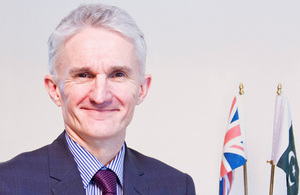Senior DFID official visits Pakistan
The UK will continue to work in partnership with Pakistan – at both the federal and provincial levels

The UK Department for International Development’s (DFID) Permanent Secretary Mark Lowcock arrived in Pakistan for a brief visit earlier today.
During his visit, Mark Lowcock met Finance Minister Ishaq Dar, Federal Board of Revenue (FBR) Chairman Tariq Bajwa and Privatisation Commission Chairman Mohammad Zubair.
The discussions focused on Pakistan’s progress on ambitious plans for taxation and privatisation reform and DFID’s close working relationship with the government in these areas.
Mark Lowcock also met Benazir Income Support Programme (BISP) Secretary Shabbir Ahmed. He commended BISP’s work on taking forward the social safety net and urged the Pakistan Government to further strengthen and expand this programme to provide a critical lifeline to some of the poorest families.
DFID Permanent Secretary Mark Lowcock said,
I can see that Pakistan has taken great strides on economic reform including on taxation, privatisation and expanding the safety net for the poor.
Pakistan has shown commitment to increasing tax collection and its tax-to-GDP ratio. DFID is already working with the government through Her Majesty’s Revenue and Customs (HMRC) to help support the FBR to pursue its ambitious tax reforms and goals.
Pakistan’s national social safety net, which is a critical lifeline for some of the poorest families, has so far reached women from 4.8 million families through small monthly payments which help ensure basic necessities, nutrition and family health.
This is also a crucial step in empowering women and opening up more opportunities for them. Women invest nearly all the money they earn back into their family to educate and feed their children. DFID will continue to work with the government to strengthen this national social safety net.
The UK will continue to work in partnership with Pakistan – at both the federal and provincial levels – to deliver on their ambitious plans to tackle poverty by creating more jobs, transforming education, increasing the tax base, stimulating growth, and providing better services to millions of children, women, and men across Pakistan. I was particularly pleased to hear of progress in basic education in Khyber-Pakhtunkhwa and the education reforms in Punjab being driven by the Chief Minister’s Road-Map.
Pakistan is now one of the UK’s largest recipients of development investment. As well as tackling the education emergency, other priorities for the UK include preventing thousands of women dying in childbirth by funding skilled midwives, nurses, or doctors for one million childbirths; providing job skills training to tens of thousands of the poorest people; and giving women in deprived households small monthly cash grants to purchase essentials, such as food and medicine.
Notes to editors
-
Across Pakistan, the UK is working closely with federal and provincial governments and partners on ambitious plans which will benefit millions of children and improve the standard of their education.
-
Pakistan is now one of the UK’s largest recipients of development investment.
-
As well as tackling the education emergency, other priorities for the UK in Pakistan include preventing thousands of women dying in childbirth by funding skilled midwives, nurses, or doctors; providing job skills training to tens of thousands of the poorest people; and giving women in deprived households small monthly cash grants to purchase essentials, such as food and medicine.
-
UK development investment is dependent on continuing to secure value for money and results.
DFID - the Department for International Development
Leading the British Government’s fight against world poverty. Find out more at: https://www.gov.uk/government/world/pakistan
In Pakistan, contact the DFID-Pakistan media team on + 92 (0) 51 201 2580.
Get free-to-use photos, videos and features online: DFID
For breaking news, follow us on Twitter: @DFID_Press